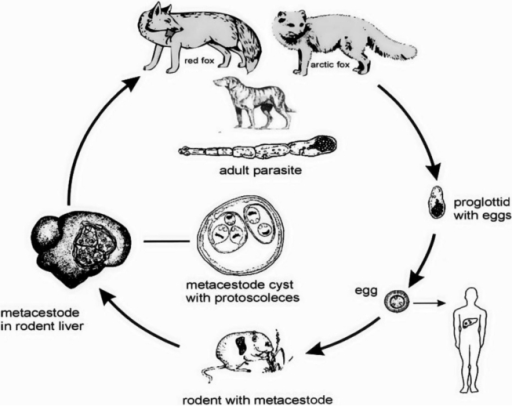Echinococcus multilocularis
In 2012 the first dog in Ontario was diagnosed with an infection of Echinococcus multilocularis. A parasite previously believed not to be present in Ontario although found in the North and West of Canada.Echinococcus multilocularis is a tiny tapeworm usually found in the small intestines of foxes and coyotes. The eggs in the animals’ feces are picked up by rodents, where they develop into an intermediate stage and cause alveolar hydatid cysts in the liver that are ultimately fatal. When foxes or coyotes eat these rodents, the adult tapeworm develops and the cycle continues. The parasite can also infect dogs and cats if they eat rodents.
The parasite poses a significant health risk to humans: if people ingest the parasite’s eggs they may develop the intermediate stage in the liver, which has a high mortality rate if left untreated. Much of the research on this parasite has been done in Switzerland, where it is becoming a significant problem.
The dog in question had never been outside of the province, so the ssumption is made that the parasite is present in wild canids in Ontario. Since the first dog was diagnosed two more dogs have been found to carry the parasite in the intermediate stage.
This parasite is treatable in wild canids as they are the definitive host and don’t develop the hydatid cysts. The eggs however are hardy and resistant to cleaning and chemicals.
To date there has been no confirmed presence of this parasites in our wild canid population, but research is ongoing. Fecal matter needs to be sent to a Swiss lab for testing and so there has been a delay.
A researcher at OVC is currently collection intestinal content samples out of wild canid cadavers from all over Ontario and this summer the samples will be flown to Switzerland for testing.
The CWHC therefore has an interest in all wild canid carcasses and asks for them to be submitted via the normal route.
All though this parasite has not yet been confirmed present in the wild population it is highly unlikely that it is not there. All AWC please take appropriate precautions to prevent human cases of this nasty parasite. Proper PPE, working protocol and good hygiene should help prevent the spread to humans.





